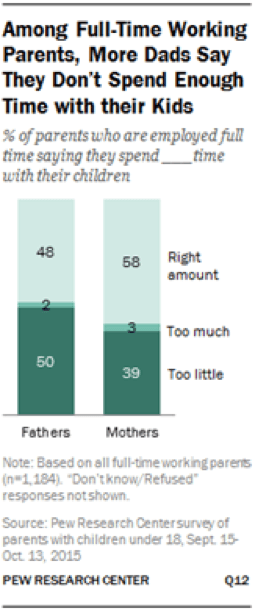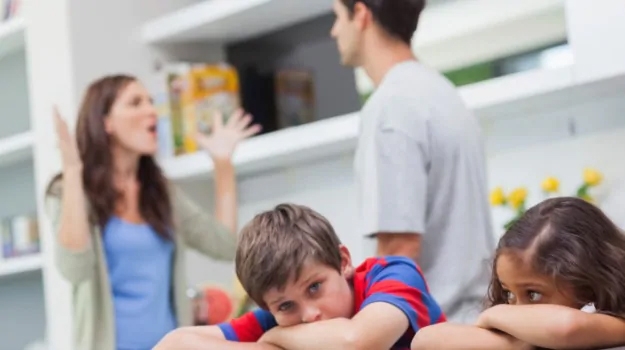Parenting is a roller-coaster ride of guilt and pride, especially if both you and your spouse are working. There has been a sharp increase in the number of families where both the parents are working than the previous decade, and unfortunately, it might be somehow permanently scarring your little one.
Ever wondered how your work affects your children’s lives? Work and Family – Allies or Enemies? A new book by Stewart D. Friedman and Jeffrey H. Greenhaus covers a study of 860 individuals, both men and women, exploring the relationship between work and family life, describing it as both allies and enemies. Children suffer the unseen collateral damage due to their parents’ work life, as evidenced by the increasing mental health issues and emotional vulnerability challenges amongst children, which has led to an urgent need of looking into the effect of parents’ careers on children’s lives. Stewart and Jeffrey are further researching about how children are negatively affected by their parents being digitally distracted at home, and the harmful effect of work stress on family life. It will be interesting to learn what they find out!
A journal article published by American Psychological Association delved into the impact of mothers who returned to work early in the lives of their children and its distal association with achievement and behavior problems. Although this study focused on working mothers, we have to take into account that even the father’s involvement in a child’s growth has started gaining importance. The timing of a father’s employment in the span of children’s lives, whether the fathers are employed full time or work part time, has a significant role to play in the effect of it on family life. The research went beyond this, to look at parent’s values of career and family, and the psychological interference of work on family life – Most of the times parents are physically present but are mentally engulfed in work.
The research found that all the aspects of parent’s careers correlate with the degree of child’s display of behavior problems – key indicator of mental health as a measure against the child behavior checklist published by Wikipedia. Unfortunately, the effect of parents’ work experiences on children’s mental health has still not been a priority for research in this field. Some of the observations from the study are:
- In case of both the mother and father, the physical presence helped in the emotional health of the children.
- Parents who believed family comes first regardless of time spent at work showed positive correlation to children’s wellbeing.
- The children were better off when parents take their work as a source of challenge creativity and enjoyment.
Fathers’ cognitive interference of work during family and relaxation time (including the physical presence, but being mentally involved in work or on digital devices) also contributes to children having emotional and behavioral problems. On the contrary, if the father feels accomplished and satisfied with his job, his little ones are less likely to show behavior problems with no correlation to the amount of time spent at work.
On the other hand mothers’ work is associated with mentally healthier children if they have authority and discretion at work. When mothers have control over their work it has a positive correlation to the children’s behavior. Not just work, at home also, if mothers spend most of their time in household chores the outcome is same as non-favorable working circumstances. Contrarily, if mothers spend time on self-care and relaxation, there are positive outcomes for children. It’s not just about mothers being at work or home, it’s about what they do when they are at home in their personal time contributing to children’s behavior

Parenting is a roller-coaster ride of guilt and pride, especially if both you and your spouse are working. There has been a sharp increase in the number of families where both the parents are working than the previous decade, and unfortunately, it might be somehow permanently scarring your little one.
Ever wondered how your work affects your children’s lives? Work and Family – Allies or Enemies? A new book by Stewart D. Friedman and Jeffrey H. Greenhaus covers a study of 860 individuals, both men and women, exploring the relationship between work and family life, describing it as both allies and enemies. Children suffer the unseen collateral damage due to their parents’ work life, as evidenced by the increasing mental health issues and emotional vulnerability challenges amongst children, which has led to an urgent need of looking into the effect of parents’ careers on children’s lives. Stewart and Jeffrey are further researching about how children are negatively affected by their parents being digitally distracted at home, and the harmful effect of work stress on family life. It will be interesting to learn what they find out!
A journal article published by American Psychological Association delved into the impact of mothers who returned to work early in the lives of their children and its distal association with achievement and behavior problems. Although this study focused on working mothers, we have to take into account that even the father’s involvement in a child’s growth has started gaining importance. The timing of a father’s employment in the span of children’s lives, whether the fathers are employed full time or work part time, has a significant role to play in the effect of it on family life. The research went beyond this, to look at parent’s values of career and family, and the psychological interference of work on family life – Most of the times parents are physically present but are mentally engulfed in work.
The research found that all the aspects of parent’s careers correlate with the degree of child’s display of behavior problems – key indicator of mental health as a measure against the child behavior checklist published by Wikipedia. Unfortunately, the effect of parents’ work experiences on children’s mental health has still not been a priority for research in this field. Some of the observations from the study are:
- In case of both the mother and father, the physical presence helped in the emotional health of the children.
- Parents who believed family comes first regardless of time spent at work showed positive correlation to children’s wellbeing.
- The children were better off when parents take their work as a source of challenge creativity and enjoyment.
Fathers’ cognitive interference of work during family and relaxation time (including the physical presence, but being mentally involved in work or on digital devices) also contributes to children having emotional and behavioral problems. On the contrary, if the father feels accomplished and satisfied with his job, his little ones are less likely to show behavior problems with no correlation to the amount of time spent at work.
On the other hand mothers’ work is associated with mentally healthier children if they have authority and discretion at work. When mothers have control over their work it has a positive correlation to the children’s behavior. Not just work, at home also, if mothers spend most of their time in household chores the outcome is same as non-favorable working circumstances. Contrarily, if mothers spend time on self-care and relaxation, there are positive outcomes for children. It’s not just about mothers being at work or home, it’s about what they do when they are at home in their personal time contributing to children’s behavior






